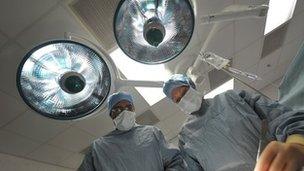Analysis: What next for the NHS?
- Published

The health bill has had a controversial passage through Parliament
Bruised and battered, the Health and Social Care Bill looks like it is finally hauling itself over the Parliamentary finish line.
After hours of debate, hundreds of amendments and an unprecedented pause in its progress, the bill is expected to get the thumbs up from MPs on Tuesday night.
If it does, it will mark the end of a torturous 14 months since the legislation was introduced into Parliament.
But for the NHS in England it is just the start of the process.
Laying the foundations
In truth, much of the groundwork has already been done. One of the criticisms of the government has been that it has been pushing ahead with the changes even before Parliament has had its say.
Thousands of staff have already been laid off, meaning the existing management bodies - primary care trusts - have had to merge during the transition.
The national board, which will oversee the new system, was established in shadow form in October and since then a host of senior appointments have been made.
Meanwhile, at a local level, GPs have been forming themselves into groups - known as clinical commissioning groups - for the past 18 months. They will be the bodies that take responsibility for spending 60% of the NHS budget.
There are now 240 of them, although that could change if some of the smaller ones merge as has been happening in the past few months.
The new structure of the health service has also been set out. Below the board will be four regional hubs and then beyond that 50 local offices.
From April, competition in the health service will be extended to include a host of community services such as physiotherapy and podiatry - it is already available to patients who are undergoing non-emergency operations such as knee and hip replacements.
And then once autumn comes round, the national board will start vetting the GP-led groups to check they are ready to start managing local health services and Monitor will take on its new functions as economic regulator.
The big bang
Then 1 April 2013 marks the day the new NHS is born. Strategic health authorities and PCTs will be abolished, leaving the GP-led groups and the national board to take on their full functions.
However, the board will retain ultimate responsibility for the budget for those groups which have not been authorised to take full control of the purse strings.
Meanwhile, local authorities will take control of public health - something they used to do up until the mid 1970s.
This will mean directors of public health, currently employed by PCTs, will move across to local government and, on a practical level, schemes designed to encourage healthier lifestyles will be organised by local councils.
A new body, Public Health England, will be created within the Department of Health to take a lead on the issue.
But for all the controversy over the changes, this date is likely to pass many people by.
For patients visiting their GP practice or those being treated on the wards of hospitals, there will be little noticeable change.
The new world
The polarised nature of the debate has meant that many of the views expressed have got ever more extreme.
That has made it hard for most independent observers to predict what is really going to happen.
The NHS is a large organisation - it employs 1.4 million in England and commands a budget in excess of £100bn - and as such any changes are likely to be gradual.
In fact, the NHS Partners Network, which represents the firms which already see NHS patients, predicts there will not be any significant rise in private sector involvement for at least five years.
If anything, the months following the April launch will be all about supporting the new GP-led groups.
Those not yet authorised will be helped to get their house in order. But if progress is not forthcoming then they risk being amalgamated into other groups.
But in the medium term the major focus will be on finances. The NHS is having to make £20bn of savings by 2015. It has started well, but if it is to meet the challenge the GP groups will have to find their feet quickly.